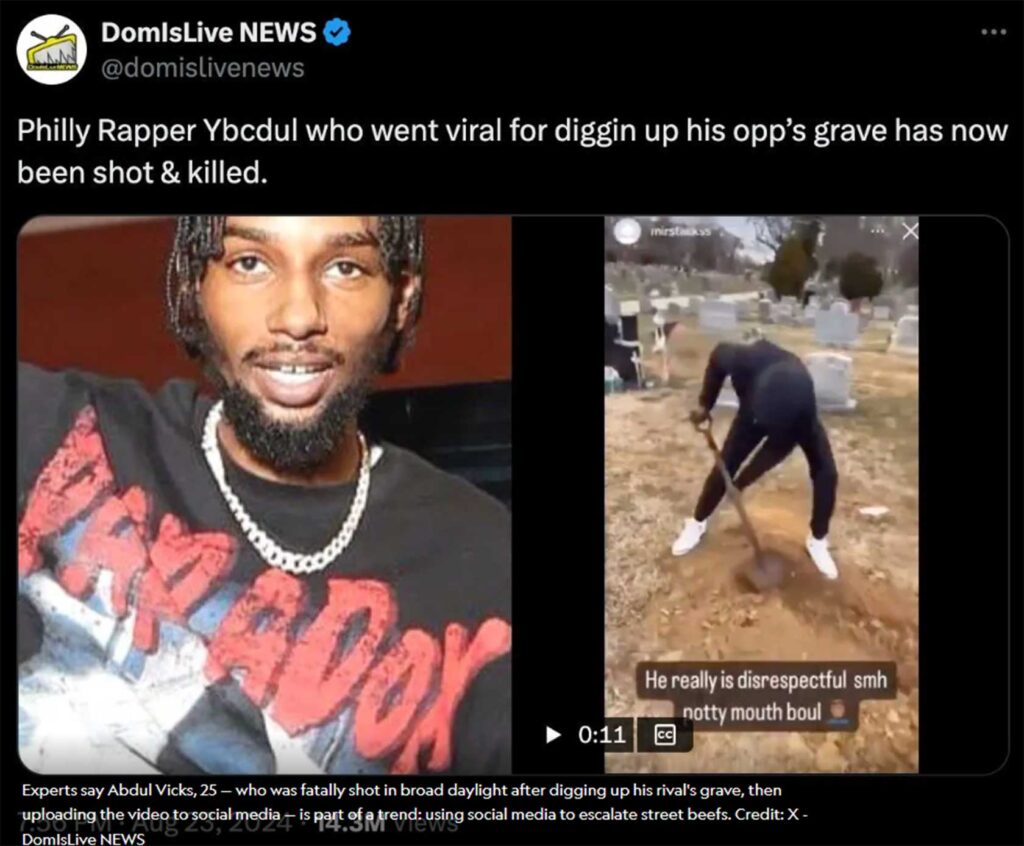
A well-known figure in Philadelphia’s bustling hip-hop scene, rapper YBC Dul had a following many musicians would envy. He had more than 30,000 monthly listeners on Spotify, and his YouTube and Instagram videos drew more than a million views.
But some of those posts showed Dul’s exploits as a reputed criminal gang leader — videos he shot and uploaded to social media himself. In February, police say, he recorded his most brazen act: digging up the grave of a murdered gang rival, then taunting the dead man’s crew by posting the video online.
Days later, Young Bag Chaser Dul — real name, Abdul Vicks, age 25 — was gunned down in broad daylight on a busy downtown street.
Vicks’ killing shook the city, already reeling from the steady drumbeat of gun violence. But experts say his death is part of a disturbing trend: young people starting or escalating conflicts on social media, then using guns to settle things on the street.
From New York to Chicago to Los Angeles, experts say, cases like Vicks’ are playing out in cities nationwide, with rivalries or personal beefs being turbocharged in cyberspace.
Cyberbanging
Researcher Desmond Upton Patton, a professor at the University of Pennsylvania, put a finer point on it in a commentary for The Trace.
“[T]he frequency with which young people use platforms like Facebook, Twitter, and Instagram to hurl insults, taunt enemies, and brag about violent acts is playing a meaningful role in fueling retaliatory efforts between gangs and cliques in marginalized neighborhoods,” he wrote.
Patton pioneered research in the use of social media and artificial intelligence in the study of gun violence. He coined the term “internet banging” while researching how urban gangs use social media.
While the overwhelming majority of social media users are above board, the trend of cyberbanging has profound consequences for Black youth — particularly boys and young men growing up in underserved communities, where opportunities are scarce, guns are available, and respect is a precious commodity.
Disrespect and trauma
“Many disputes stem from perceived disrespect among insecure young adults who may lack impulse control and conflict-management skills,” says Dr. LJ Punch, a trauma surgeon and director of the Bullet-Related Injury Clinic in St. Louis.
“Social media is an extremely powerful tool for metastasizing disrespect,” Punch said. And of all the causes of gun violence, social media-fueled grudges are “the most impenetrable,” Punch told NPR.
Dr. Franklin Cosey-Gay, project director of the Chicago Center for Youth Violence Prevention, concurs.
“[T]here is an element where the people that have been impacted by trauma, and not being able to address trauma, are expressing themselves in ways that show that they’re traumatized — and they’re using that as a way to help them heal,” he says. “But it is a vicious cycle.”
Glen Upshaw, who manages outreach workers at Youth Alive in Oakland, said he sees kids as young as age 12 ensnared in this problem.
“Social media has become such a part of people’s lives that they’re living it as if it’s reality,” says Upshaw whose organization works as violence interrupters. “They’re purchasing a lot of trouble — jail, death, even someone in their family being harmed.”
Free expression, controversial content
There is no question social media offers a space for free expression for young people: Roughly 95% of children ages 13–17 report using it . More than a third say they use social media “almost constantly,” and nearly 40% of children ages 8–12 have bypassed the platforms’ age barriers to open their own accounts.
But using social media to fuel “beef” causes minor issues to get out of hand.
Since powerful algorithms prioritize user engagement, platforms like Twitter or TikTok often end up amplifying controversial content, making it more visible to a larger, targeted audience. While most platforms have policies against hate speech, enforcing these policies is a challenge, and social media companies are facing growing pressure to change how they interact with young people.
Meta, which owns Facebook, Instagram and WhatsApp, this week launched “Teen Accounts,” for users under age 18. Featuring built-in privacy protections, the accounts will be automatic for all Instagram users who are minors — including those already using the app. Users younger than 16 will need a parent’s permission if they want to change their account’s built-in protections.
Upshaw believes families can play an important role in changing this cycle by paying attention. Speaking from experience, he says, “At times, even family members hesitate to get involved for many reasons until someone gets hurt. Don’t become a victim to become part of this work.”
Glen Upshaw has been with Youth Alive since 2016 and got involved in violence prevention after his sons fell into violence — one age 17 and one age 19. They eventually served time and have since been released.
“I made an oath to myself and determined to make a difference in people’s lives and in the community,” he says.
This story appeared at Word in Black on Sept. 19, 2024.






